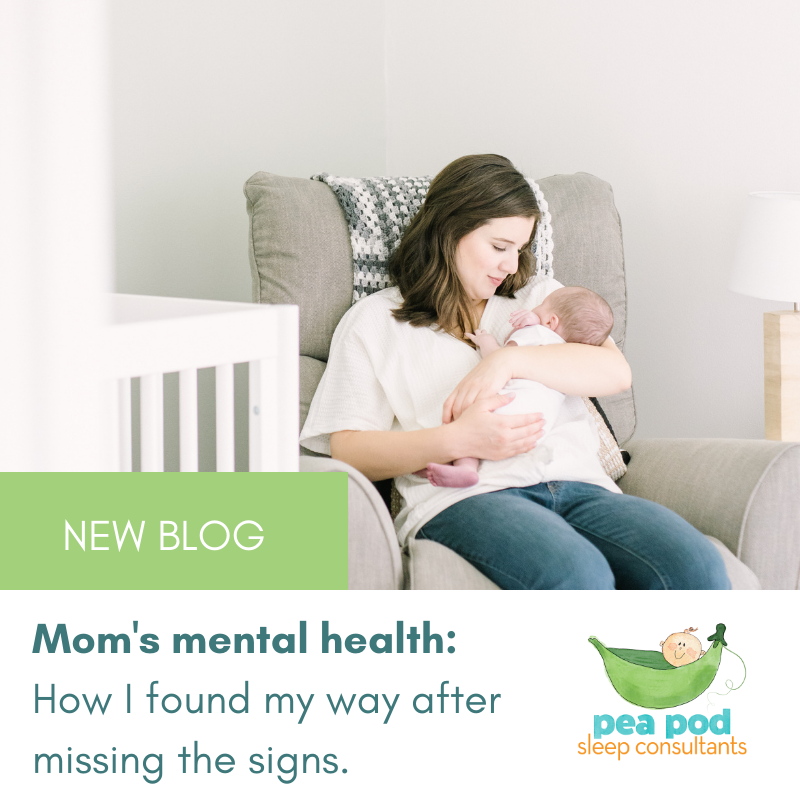
Photo by Abby Park Photography
A 95 degree day felt easily 120 degrees as I waited for our food. This was supposed to be a first-ever family fun adventure, but felt more like I was in a tunnel full of fire.
I walked out of the custard stand and stared at my husband across the parking lot without saying a word.
“Are you okay?” he asked, hurrying over. He says I looked like I’d seen a ghost.
“No, we need to go,” I told him without explanation. I didn’t have one to offer.
Months later, sitting on the couch in my therapist’s dimly lit, air conditioned office, I would learn that was my first panic attack, 10 days postpartum with our beautiful baby boy. It wasn’t my last.
Having Postpartum Anxiety didn’t exactly surprise me. I’ve had some level of anxiety most of my life, managed through therapy and lifestyle. My Obsessive Compulsive Disorder (OCD) diagnosis was new, but fit with my symptoms and family history. Even after my diagnosis, though, I’m still surprised by the symptoms my highly-trained therapist recognized that I never would have.
The Postpartum Symptoms I Didn’t See
First of all, I had no idea a panic attack wasn’t what you see on TV. You know, when the (usually a) woman hyperventilates and has to breathe into a bag or put her head between her knees. For me, I got really hot, a little dizzy and felt trapped.
Second, she introduced me to intrusive thoughts. When you’re an over-thinker like me, most thoughts feel a little intrusive. But in this case, my intrusive thoughts popped up as vivid visions of my son getting hurt. I worried as I crossed every door jam because I could clearly see I was going to accidentally slam his head into it, causing him great harm. He was definitely going to fall into a corner of our furniture when I inevitably tripped and he went flying from my arms. Germs became visible, floating in the air like particles of dust in a beam of winter sunshine.
With my therapist’s help I realized the compulsions I was using to quiet the obsessive thoughts (that’s why it’s called Obsessive Compulsive Disorder). Excessive hand-washing, floor cleaning, seizing control of household duties because if something wasn’t cleaned “right” we were all going to get gravely ill. Keep in mind, this was pre-COVID. My behavior was above and beyond the call of motherly duty.
As the baby blues days passed (doctors will tell you two weeks postpartum) I still cried a lot. Everything terrified me. And when visitors would leave I always thought to myself “it’s just you and me kid, I’m sorry you’re stuck with me.”
I broke down one night when my husband again asked me “Are you okay?”
This time I answered “I don’t think I am.”
Moving Forward
I found my incredible therapist, and after many weeks together we decided medication would help me best manage my symptoms. A healthy mom makes for a healthier family.
In a couple of months, we’ll welcome our second child into the world. I am so excited for the baby snuggles, watching our son become a big brother and all the joy that comes with a new baby. I’m also very aware there’s a chance the darkness of postpartum mental health issues could creep in again. Luckily, I made the choice (in collaboration with my medical team) to stay on my medication and I continue to see my therapist, and will after the baby is born.
I believe my anxiety and OCD came from my deepest maternal instincts- the basic drive to protect my child. And in some ways, that’s a strength. On the good days, I can see that. On the rest of the days, I feel the normal ups and downs of motherhood. We all have challenges, and like many, mental health is mine. If it’s yours, or you think it might be yours, and you need someone to talk to, send me a message. Tell someone you trust. Tell someone who knows you best. “I don’t think I’m okay.”
It’s okay not to be okay, and with the right help you will be.
If you need help, please reach out:
- Mom’s Mental Health Initiative (based in Milwaukee): https://momsmentalhealthmke.org/
- National Suicide Prevention Lifeline: http://www.suicidepreventionlifeline.org/
- Postpartum Support International: https://www.postpartum.net/
